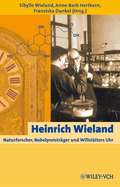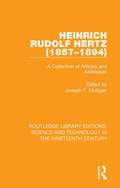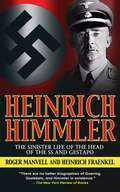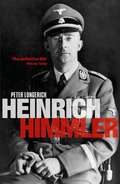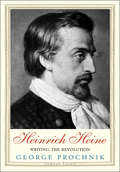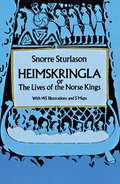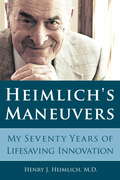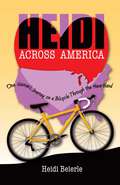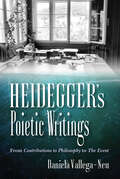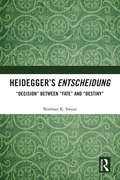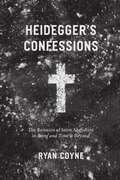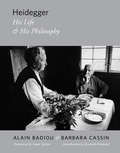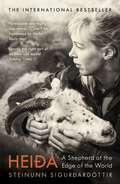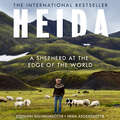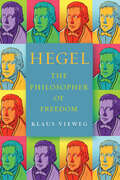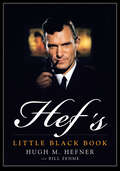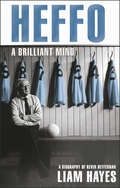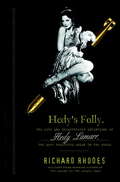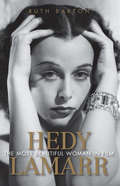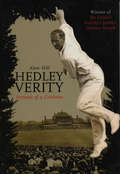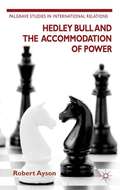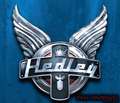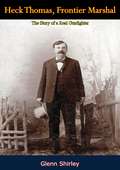- Table View
- List View
Heinrich Wieland: Naturforscher, Nobelpreisträger und Willstätters Uhr
by Herausgegeben Von Sibylle Wieland Anne-Barb Hertkorn Franziska DunkelHeinrich Wieland (1877 - 1957, Nobelpreis 1927) gilt heute als einer der Pioniere der Naturstoff-, der Medizinal- und der Biochemie. Nicht nur hat er wegweisende Grundlagenforschung betrieben, sondern auch - ein frühes Zeugnis akademisch-industrieller Kooperation -- Arzneimittel entwickelt, die zum Teil noch heute bekannt sind. Und er war ein aufrechter Mensch, wie seine Doktorandin Hildegard Hamm-Brücher bezeugt: "Er war ein exzeptioneller Widersteher - ... Er hatte sich vorgenommen, dass er es bis zum Ende durchhalten und sein Verhalten vor sich und seinen Mitmenschen verantworten könne. Mit diesem Vorsatz trat er bereits 1925 die Nachfolge des wegen antisemitischer Strömungen und Störungen zurückgetretenen Richard Willstätter an ... Wir alle haben dieses Institut ((für Chemie der Universität München)) als "Oase der Anständigkeit" empfunden." (Hildegard Hamm-Brücher, Chemie in unserer Zeit, 2004) In seiner Laudatio zur Verleihung des Friedenspreises 2007 des Deutschen Buchhandels an Saul Friedländer formulierte Wolfgang Frühwald: "Die Bilder der Erinnerung werden weniger ... die Geschichtsbilder werden jetzt fixiert, die Erinnerungsorte jetzt festgelegt, die Anteile von Erinnerung und Vergessen jetzt voneinander geschieden." Die Herausgeber und Autoren erinnern in diesem Sinne an Heinrich Wieland, ein Leuchtturm in dunklen Zeiten. Sich mit Heinrich Wieland beschäftigen heißt, sich mit Zeit-, Industrie- und Forschungsgeschichte zu beschäftigen und daraus für die Zukunft zu lernen.
Heinrich Rudolf Hertz: A Collection of Articles and Addresses (Routledge Library Editions: Science and Technology in the Nineteenth Century #6)
by Joseph F. MulliganThis book, first available in 1994, was published to commemorate the one-hundredth anniversary of Heinrich Hertz’s death at the terribly young age of thirty-six. The introductory biography together with eleven papers by Hertz and seven about him are intended to highlight the importance of Hertz’s contributions to physics and at the same time to serve the needs of anyone interested in doing research on this highly gifted scientist.
Heinrich Himmler: The Sinister Life of the Head of the SS and Gestapo
by Heinrich Fraenkel Roger ManvellAuthors Roger Manvell and Heinrich Fraenkel, notable biographers of the World War II German leaders Joseph Goebbels and Herman Goring, delve into the life of one of the most sinister, clever, and successful of all the Nazi leaders: Heinrich Himmler. As the head of the feared SS, Himler supervised the extermination of millions. Here is the story of how a seemingly ordinary boy grew into an obsessive and superstitious man who ventured into herbalism, astrology, and homeopathic medicine before finally turning to the "science" of racial purity and the belief in the superiority of the Aryan people.
Heinrich Himmler
by Peter LongerichAs head of the SS, chief of police, 'Reichskommissar for the Consolidation of Germanness', and Reich Interior Minister, Heinrich Himmler enjoyed a position of almost unparalleled power and responsibility in Nazi Germany. Perhaps more than any other single Nazi leader aside from Hitler, his name has become a byword for the terror, persecution, and destruction that characterized the Third Reich. His wide-ranging powers meant that he bore equal responsibility for the repression of the German people on the home front and the atrocities perpetrated by the SS in the East. Yet, in spite of his central role in the crimes of the Nazi regime, until now Himmler has remained a colourless and elusive figure in the history of the period. <p><p> In this, the first-ever comprehensive biography of the SS-Reichsführer, leading German historian Peter Longerich puts every aspect of Himmler's life under the microscope. Masterfully interweaving the story of Himmler's personal life and political career with the wider history of the Nazi dictatorship, Longerich shows how skilfully he exploited and manipulated his disparate roles in the pursuit of his far-reaching and grandiose objectives. In the process, he illuminates the extraordinary degree to which Himmler's own personal prejudices, idiosyncrasies, and predilections made their mark on the organizations for which he was responsible - especially the SS, which in so many ways bore the characteristic hallmarks of its leader, and whose history remains both incomplete and incomprehensible without a detailed and intimate knowledge of its deeply sinister commander-in-chief.
Heinrich Heine: Writing the Revolution (Jewish Lives)
by George ProchnikA thematically rich, provocative, and lyrical study of one of Germany’s most important, world-famous, and imaginative writers Heinrich Heine (1797–1856) was a virtuoso German poet, satirist, and visionary humanist whose dynamic life story and strikingly original writing are ripe for rediscovery. In this vividly imagined exploration of Heine’s life and work, George Prochnik contextualizes Heine’s biography within the different revolutionary political, literary, and philosophical movements of his age. He also explores the insights Heine offers contemporary readers into issues of social justice, exile, and the role of art in nurturing a more equitable society. Heine wrote that in his youth he resembled “a large newspaper of which the upper half contained the present, each day with its news and debates, while in the lower half, in a succession of dreams, the poetic past was recorded fantastically like a series of feuilletons.” This book explores the many dualities of Heine’s nature, bringing to life a fully dimensional character while also casting into sharp relief the reasons his writing and personal story matter urgently today.
Heinrich Glarean's Books
by Iain Fenlon Inga Mai GrooteThis collection of essays investigates the work of Heinrich Glarean, one of the most influential humanists and music theorists of the sixteenth century. For the first time, Glarean's musical writings, including his masterwork the Dodekachordon, are considered in the wider context of his work in a variety of disciplines such as musicology, history, theology and geography. Contributors reference books from Glarean's private library, including rare and previously unseen material, to explore his strategies and impact as a humanist author and university teacher. The book also uses other newly discovered source material such as course notes written by students and Glarean's preparations for his own lectures to offer a fascinating picture of his reactions to contemporary debates. Providing a detailed analysis of Glarean's library as reconstructed from the surviving copies, Heinrich Glarean's Books offers new and exciting perspectives on the multi-disciplinary work of an accomplished intellectual.
Heimskringla: or, The Lives of the Norse Kings
by Snorri SturlusonGreat classic by Icelandic poet/chieftain chronicles the reigns of 16 high kings descended from the warrior-wizard god Odin. Major section on 15-year reign of Olav II Haraldson, patron saint of Norway. Based on earlier histories, oral traditions, plus new material by author, all presented with intelligence, warmth and objectivity. Over 130 illustrations and 5 maps.
Heimlich's Maneuvers
by Henry J. HeimlichHere, in his own words, is the story of one of the twentieth century's most creative medical innovators, Dr. Henry Heimlich. The thoracic surgeon is best known for having developed the Heimlich Maneuver, the world's easiest-to-learn and most universally known method to save people from choking to death on food or foreign objects. But many don't know about Dr. Heimlich's other life-saving inventions. He is the inventor of the Heimlich Chest Drain Valve, which saved thousands of lives during the Vietnam War, and the Heimlich MicroTrach, which provides a remarkably efficient way for people to take oxygen. In the present decade, Dr. Heimlich has turned his attention to two devastating illnesses for which medicine has not yet found a cure--cancer and HIV. He describes his research and its promise, as well as the controversy and resistance his new ideas have generated from the medical establishment.Interweaving the author's personal life with riveting stories of his numerous medical breakthroughs, this rich memoir provides insights into the workings of a creative mind and the machinations of the American medical system.From the Trade Paperback edition.
Heidi Across America: One Woman's Journey on a Bicycle Through the Heartland
by Heidi BeierleA memoir of homecoming – Heidi Across America is a gritty story of how opening our hearts to others enables us to open our hearts to ourselves and love what we find there.In the summer of 2010, Heidi Beierle had just finished her first year of graduate studies in community and regional planning and decided to pedal her bicycle solo from her home on the west coast across rural America to the Preserving the Historic Road conference in Washington, D.C. What started as a research trip turned into an intimately physical and psychological encounter with self and nationhood. Heidi was 35 at the time and didn&’t love much about herself except her ability to endure grueling physical undertakings. She viewed her journey as an opportunity to fix her failures and insufficiencies. There were also some research questions she wanted to explore: Why do people live in small towns and what do they like about it? Did a bicyclist like herself bring economic benefit to the small towns she visited? What could communities do to support or invite cyclists to stay in their towns? What could cyclists do to support the communities? Along the way, she was surprised by the kindness of strangers and the emotional pinch of traveling through Wyoming where she grew up. Her journey led her through the Plains and into the Ozarks where the heat climbed to agonizing temperatures and every pedal stroke in the heat felt one closer to death. By the time she completed the trip, Heidi discovered a newfound compassion for herself and a growing love for her country. Strangers opened their hearts to her and in turn, she opened her heart to herself. And her questions began to change and mirror things many Americans are asking themselves today: How can I be okay in my own skin? What does it mean to be enough? How do I satisfy my desire to travel without harming the planet? What does it mean to love America? For many young people, it is a rite of passage to light out on an adventure to see the world and expose themselves to new experiences, but we don&’t often talk about how Americans seeing America can open us to the diversity, awe, and wonder available right here in our nation. Heidi Across America offers a journey to self-love, empathy, consideration for others, and respect for the spirit of place as pathways to find connection and home.
Heidegger's Poietic Writings: From Contributions to Philosophy to The Event (Studies in Continental Thought)
by Daniela Vallega-Neu“A landmark achievement in Heidegger scholarship . . . displays a rigorous, thoughtful, and nuanced understanding of the whole of Heidegger’s notebooks.” —Andrew J. Mitchell, author of The Fourfold: Reading the Late HeideggerEngaging the development of Heidegger’s non-public writings on “the event” between 1936 and 1941, Daniela Vallega-Neu reveals what Heidegger’s private writings kept hidden. Vallega-Neu takes readers on a journey through these volumes, which are not philosophical works in the traditional sense as they read more like fragments, collections of notes, reflections, and expositions.In them, Vallega-Neu sees Heidegger searching for a language that does not simplyspeak about being, but rather allows a sense of being to emerge in his thinking and saying. She focuses on striking shifts in the tone and movement of Heidegger’s thinking during these important years. Skillfully navigating the unorthodox and intimate character of these writings, Vallega-Neu provides critical insights into questions of attunement, language, the body, and historicity in Heidegger’s thinking.
Heidegger’s Entscheidung: “Decision” Between “Fate” and “Destiny”
by Norman K. SwazoThis book critically examines the debate on Martin Heidegger’s concept of Entscheidung ("decision") and his engagement and confrontation with Nazism in terms of his broader philosophical thought. It argues that one cannot explain Heidegger’s actions without accounting for his idea of "decision" and its connection to his understanding of individual "fate" and national (and European) "destiny." The book looks at the relation of biography to philosophy and the ethical and political implications of appropriating Heidegger’s thinking in these domains of inquiry. It highlights themes such as Heidegger’s differences with the neo-Kantians in Germany; Heidegger on Kant and practical reason; and his reading of Nietzsche and Hegel. It offers a philosophical assessment grounded in Heidegger’s own texts, with reference to historical and other philosophical commentaries on the rise of National Socialism in post-Weimar Germany and the philosophical issues associated with the interpretation of Nazi genocide and ideology. An important intervention in Western philosophy, this book will be of great interest to scholars and researchers of political philosophy, continental philosophy, German philosophy, philosophy in general, and political studies.
Heidegger's Confessions: The Remains of Saint Augustine in "Being and Time" and Beyond
by Ryan CoyneAlthough Martin Heidegger is nearly as notorious as Friedrich Nietzsche for embracing the death of God, the philosopher himself acknowledged that Christianity accompanied him at every stage of his career. In "Heidegger's Confessions," Ryan Coyne isolates a crucially important player in this story: Saint Augustine. Uncovering the significance of Saint Augustine in Heidegger s philosophy, he details the complex and conflicted ways in which Heidegger paradoxically sought to define himself against the Christian tradition while at the same time making use of its resources. Coyne first examines the role of Augustine in Heidegger s early period and the development of his magnum opus, "Being and Time. " He then goes on to show that Heidegger owed an abiding debt to Augustine even following his own rise as a secular philosopher, tracing his early encounters with theological texts through to his late thoughts and writings. Bringing a fresh and unexpected perspective to bear on Heidegger s profoundly influential critique of modern metaphysics, Coyne traces a larger lineage between religious and theological discourse and continental philosophy. "
Heidegger: His Life and His Philosophy (Insurrections: Critical Studies in Religion, Politics, and Culture)
by Alain Badiou Barbara CassinMartin Heidegger was an ordinary Nazi and a loyal member of the provincial petty bourgeoisie. He was also a seminal thinker of the Continental tradition and one of the twentieth century's most important philosophers. How are we to make sense of this dual life? Should we factor Heidegger's domestic and political associations into our understanding of his thought, or should we treat his intellectual work independently of his abhorrent politics? How does any thinker reconcile the mundane with the ideal or the pursuit of philosophical inquiry with the demands of civic engagement?In Heidegger, Alain Badiou and Barbara Cassin immerse themselves in the philosopher's correspondence with his wife Elfride to answer these questions as they relate to Heidegger and all thinkers vulnerable to the politics of their times. They focus on Heidegger's tormented relationship with his wife, with Hannah Arendt, and with numerous other women, bringing an unusual level of intimacy to his personal and intellectual worlds.
Heida: A Shepherd at the Edge of the World
by Steinunn Sigurðardóttir'HEIDA IS A FORCE OF NATURE . . . EXACTLY THE RIGHT SORT OF MODERN ROLE MODEL' SUNDAY TIMESThe inspiring story of Icelandic sheep farmer, former model and feminist heroine Heida Asgeirsdottir has become a double prize-winning international bestseller.As heard on Radio 4's Start the WeekI'm not on my own because I've been sitting crying into a handkerchief or apron over a lack of interested men. I've been made every offer imaginable over the years. Men offer themselves, their sons . . . drunk fathers sometimes call me up and say things like: "Do you need a farmhand?" "I can lift the hay bales" "I can repair your tractors". . .Heida is a solitary farmer with a flock of 500 sheep in a remorseless area bordering Iceland's highlands. It's known as the End of the World. One of her nearest neighbours is Iceland's most notorious volcano, Katla, which has periodically driven away the inhabitants of Ljótarstaðir ever since people first started farming there in the twelfth century. This portrait of Heida written with wit and humour by one of Iceland's most acclaimed novelists, Steinunn Sigurðardóttir, tells a heroic tale of a charismatic young woman, who walked away from a career as a model to take over the family farm at the age of 23. I want to tell women they can do anything, and to show that sheep farming isn't just a man's game. Divided into four seasons, Heida tells the story of a remarkable year, when Heida reluctantly went into politics to fight plans to raise a hydro-electric power station on her land. This book paints a unforgettable portrait of a remote life close to nature. Translated into six languages, Heida has won two non-fiction prizes and has become an international bestseller.We humans are mortal; the land outlives us, new people come, new sheep, new birds and so on but the land with its rivers and lakes and resources, remains.'UTTERLY CHARMING' MAIL ON SUNDAY'REVELATORY AND INSPIRING' HERALD
Heida: A Shepherd at the Edge of the World
by Steinunn Sigurðardóttir'HEIDA IS A FORCE OF NATURE . . . EXACTLY THE RIGHT SORT OF MODERN ROLE MODEL' SUNDAY TIMESThe inspiring story of Icelandic sheep farmer, former model and feminist heroine Heida Asgeirsdottir has become a double prize-winning international bestseller.As heard on Radio 4's Start the WeekI'm not on my own because I've been sitting crying into a handkerchief or apron over a lack of interested men. I've been made every offer imaginable over the years. Men offer themselves, their sons . . . drunk fathers sometimes call me up and say things like: "Do you need a farmhand?" "I can lift the hay bales" "I can repair your tractors". . .Heida is a solitary farmer with a flock of 500 sheep in a remorseless area bordering Iceland's highlands. It's known as the End of the World. One of her nearest neighbours is Iceland's most notorious volcano, Katla, which has periodically driven away the inhabitants of Ljótarsta?ir ever since people first started farming there in the twelfth century. This portrait of Heida written with wit and humour by one of Iceland's most acclaimed novelists, Steinunn Sigur?ardóttir, tells a heroic tale of a charismatic young woman, who walked away from a career as a model to take over the family farm at the age of 23. I want to tell women they can do anything, and to show that sheep farming isn't just a man's game. Divided into four seasons, Heida tells the story of a remarkable year, when Heida reluctantly went into politics to fight plans to raise a hydro-electric power station on her land. This book paints a unforgettable portrait of a remote life close to nature. Translated into six languages, Heida has won two non-fiction prizes and has become an international bestseller.We humans are mortal; the land outlives us, new people come, new sheep, new birds and so on but the land with its rivers and lakes and resources, remains.'UTTERLY CHARMING' MAIL ON SUNDAY'REVELATORY AND INSPIRING' HERALD
Heida: A Shepherd at the Edge of the World
by Steinunn SigurðardóttirThe inspiring story of Icelandic sheep farmer, former model and feminist heroine has become an international bestseller and won both the Icelandic Booksellers' Prize and Women's Literature Prize.I'm not on my own because I've been sitting crying into a handkerchief or apron over a lack of interested men. I've been made every offer imaginable over the years. Men offer themselves, their sons...drunk fathers sometimes call me up and say things like: "Do you need a farmhand?" "I can lift the hay bales" "I can repair your tractors"...Heiða is a solitary farmer with a flock of 500 sheep in a remorseless area bordering Iceland's highlands. It's known as the End of the World. One of her nearest neighbours is Iceland's most notorious volcano, Katla, which has periodically driven away the inhabitants of Ljótarstaðir ever since people first started farming there in the twelfth century. This portrait of Heiða written with wit and humour by one of Iceland's most acclaimed novelists, Steinunn Sigurðardóttir, tells a heroic tale of a charismatic young woman, who at 23 walked away from a career as a model in New York to take over the family farm when her father died. I want to tell women they can do anything, and to show that sheep farming isn't just a man's game. I guess I've always been a feminist. When I was growing up, there was a female president, and I used to wear the same clothes and play with the same toys as the boys. It was just normal to me.Divided into four seasons, Heiða tells the story of a remarkable year, interwoven with vivid stories of her animals and farm work and paints a unforgettable portrait of a remote life close to nature.We humans are mortal; the land outlives us, new people come, new sheep, new birds and so on but the land with its rivers and lakes and resources, remains.(P)2019 Hodder & Stoughton Limited
Hegel: The Philosopher of Freedom
by Klaus ViewegA monumental new biography of a pivotal yet poorly understood pioneer in modern philosophy. When a painter once told Goethe that he wanted to paint the most celebrated man of the age, Goethe directed him to Georg Wilhelm Friedrich Hegel. Hegel worked from the credo: To philosophize is to learn to live freely. While he was slow and cautious in the development of his philosophy, his intellectual growth was like an odyssey of the mind, and, contrary to popular belief, his life was full of twists and turns, suspense and even danger. In this landmark biography, the philosopher Klaus Vieweg paints a new picture of the life and work of the most important representative of German idealism. His vivid portrait provides readers an intimate account of Hegel's times and the milieu in which he developed his thought, along with detailed, clear-sighted analyses of Hegel's four major works. What results is a new interpretation of Hegel through the lens of reason and freedom. Vieweg draws on extensive archival research that has brought to light a wealth of hitherto undiscovered documents and handwritten notes relating to Hegel's work, touching on Hegel's engagement with the leading thinkers and writers of his age: Kant, Fichte, Schelling, Hölderlin, and others. Combatting clichés and misunderstandings about Hegel, Vieweg also offers a sustained defense of the philosopher's more progressive impulses. Highly praised upon its release in Germany as having set the new biographical standard, this monumental work emphasizes Hegel's relevance for today, depicting him as a vital figure in the history of philosophy.
Hef's Little Black Book
by Hugh M. Hefner Bill Zehme"[A] breezy, charming chronicle."—Time Out New YorkThe legendary founder of Playboy magazine, Hugh Hefner invites you into his world with Hef's Little Black Book, an illustrated treasury of advice and maxims. The only book ever written by the iconic publisher and unabashed hedonist, Hef's Little Black Book features a new, updated Afterword from Hef himself. Dedicated Playboy readers and fans of The Girls Next Door, the hit reality TV series that takes you behind the doors of the Playboy Mansion, will not want to miss this fantastic guide to the very good life from the man who has lived it better than anyone.
Heffo - A Brilliant Mind: A Biography of Kevin Heffernan
by Liam HayesKevin Heffernan was a giant amongst GAA men. A giant with a brilliant mind who repeatedly warned everybody that he would not let his own mother get in the way of him winning one more game of football. Heffo was deeply admired and absolutely feared like no other. And like no other manager in the history of the GAA, his strength of mind and brutal toughness as a leader raised an army that was called his own – Heffo’s Army. Heffo: A Brilliant Mind tells the Kevin Heffernan story for the first time. It’s the story of a boy with the biggest dreams, and a man who lived with triumphs and the greatest regrets. It’s the story of a club, and how Heffo and St Vincent’s GAA club revolutionized the game of Gaelic football and changed the face of Dublin football forever. It’s the story, too, of a great war. Heffo: A Brilliant Mind dramatically re-enacts the battles that Kevin Heffernan fought over four decades as a footballer and a manager in a long and punishing war with Kerry. A war waged by one man with the courage and fearlessness of a true giant.
Hedy's Folly: The Life and Breakthrough Inventions of Hedy Lamarr, the Most Beautiful Woman in the World
by Richard RhodesWhat do Hedy Lamarr, avant-garde composer George Antheil, and your cell phone have in common? The answer is spread-spectrum radio: a revolutionary invention based on the rapid switching of communications signals among a spread of different frequencies. Without this technology, we would not have the digital comforts that we take for granted today. Only a writer of Richard Rhodes's caliber could do justice to this remarkable story. Unhappily married to a Nazi arms dealer, Lamarr fled to America at the start of World War II; she brought with her not only her theatrical talent but also a gift for technical innovation. An introduction to Antheil at a Hollywood dinner table culminated in a U.S. patent for a jam- proof radio guidance system for torpedoes--the unlikely duo's gift to the U.S. war effort. What other book brings together 1920s Paris, player pianos, Nazi weaponry, and digital wireless into one satisfying whole? In its juxtaposition of Hollywood glamour with the reality of a brutal war, Hedy's Folly is a riveting book about unlikely amateur inventors collaborating to change the world.From the Hardcover edition.
Hedy Lamarr: The Most Beautiful Woman in Film (Screen Classics)
by Ruth BartonHedy Lamarr's life was punctuated by salacious rumors and public scandal, but it was her stunning looks and classic Hollywood glamour that continuously captivated audiences. Born Hedwig Kiesler, she escaped an unhappy marriage with arms dealer Fritz Mandl in Austria to try her luck in Hollywood, where her striking appearance made her a screen legend. Her notorious nude role in the erotic Czech film Ecstasy (1933), as well as her work with Cecil B. DeMille ( Samson and Delilah, 1949), Walter Wanger ( Algiers, 1938), and studio executive Louis B. Mayer catapulted her alluring and provocative reputation as a high-profile sex symbol.In Hedy Lamarr: The Most Beautiful Woman in Film, Ruth Barton explores the many facets of the screen legend, including her life as an inventor. Working with avant-garde composer and film scorer George Antheil, Lamarr helped to develop and patent spread spectrum technology, which is still used in mobile phone communication. However, despite her screen persona and scientific success, Lamarr's personal life caused quite a scandal. A string of failed marriages, a lawsuit against her publisher regarding her sensational autobiography, and shoplifting charges made her infamous beyond her celebrity.Drawing on extensive research into both the recorded truths of Lamarr's life and the rumors that made her notorious, Barton recognizes Lamarr's contributions to both film and technology while revealing the controversial and conflicted woman underneath. Hedy Lamarr: The Most Beautiful Woman in Film illuminates the life of a classic Hollywood icon.
Hedley Verity: Portrait of a Cricketer
by Alan HillThe name of Hedley Verity, the master bowler of unyielding menace, is one to be cherished more than 50 years after his death. Allan Hill tells the story of a magnificent sporting obsession in this reissue of the first full-length biography of a revered cricketer. Verity headed the English first-class bowling averages in his first season with Yorkshire and twice took ten wickets in an innings in consecutive seasons. Overall, his mesmeric left-hand spin yielded 1,956 wickets, including 144 for England, in less than ten years.The book, winner of the Cricket Society's Jubilee Literary award in 1986, contains a foreword by Sir Donald Bradman (whom Verity twice dismissed at Lord's in June 1934 to mastermind England's only victory over Australia at cricket's 'headquarters' in a century). It also includes a revealing memoir of Verity's boyhood and an Australian tour journal (1932-33) kept by the Yorkshireman for his relatives and friends.The story ends with a graphic account of Verity's ultimate heroism during the Second World War and is followed by a full statistical analysis of his career.
Hedley Bull and the Accommodation of Power
by Robert AysonOffering a comprehensive account of the work of Hedley Bull, Ayson analyses the breadth of Bull's work as a Foreign Office official for Harold Wilson's government, the complexity of his views, including Bull's unpublished papers, and challenges some of the comfortable assertions about Bull's place in the English School of IR.
Hedley (Fan Lowdown )
by Karen BlissInside Music Books is pleased to introduce the Fan Lowdown series by music journalist Karen Bliss. These books offer the fan an enhanced experience. Bliss solicits stories from fans via the artist’s message board and mailing list: concert or road trip stories; meeting the artist; making cookies for the band; a song they fell in love to; a lyric that helped get them through a tough time. Bliss has interviewed the band members, sharing her most interesting submissions and getting the bands thoughts and their own memories. The result is a unique look at the artists career, remembered from both sides of the stage. Scattered throughout are photos, ticket stubs, set lists, posters, backstage passes and other mementos that add a sense of time and place. Hedleys eponymous debut album went platinum in Canada, received five Juno nominations and the Much Music Video Award for Best Pop Video for Gunnin. Their sophomore album, Famous Last Words, was released in 2007, and the band toured the U.S. and Canada, headlining as well as supporting Bon Jovi, Nickelback, Simple Plan and Three Days Grace.
Heck Thomas, Frontier Marshal: The Story of a Real Gunfighter
by Glenn ShirleyThe Old West bred some mighty tough men!Unfortunately, the general public knows little or nothing about the good ones!Billy the Kid, the Daltons, Jesse James, Sam Bass, the Youngsters, Wesley Hardin and many more are familiar as “heroes” to the children and their parents of today. So, even more unfortunately are many so-called “lawmen” who were actually nothing but hired killers, far more crooked than most of the men they eliminated!Heck Thomas deserves to be known in a way that most of the current TV “Marshals” never deserved. Fighter, yes, and killer at times, law officer of some of the toughest areas in the Southwest (such as the Cherokee Strip and other outlaw-ridden parts of Oklahoma), he never took a bribe, was a model family man, and lived to a magnificent old age, still “in hardness,” honoured as one of the last genuine heroes of the frontier by all who knew him. No one, outlaw or politician, ever made him back down and his record of arrests and captures still stands as one of the most noteworthy of any peace officer anywhere.To a public which always seeks true heroism and is proud of the iron men who built America, this man, Heck Thomas, must stand forever as the best type of man of the West, low-voiced, courteous, law-abiding, and very, very dangerous.Heck Thomas made his lifework keeping the law, and emerges from the shadowy past to blazing life as an authentic hero of the Old Frontier.
